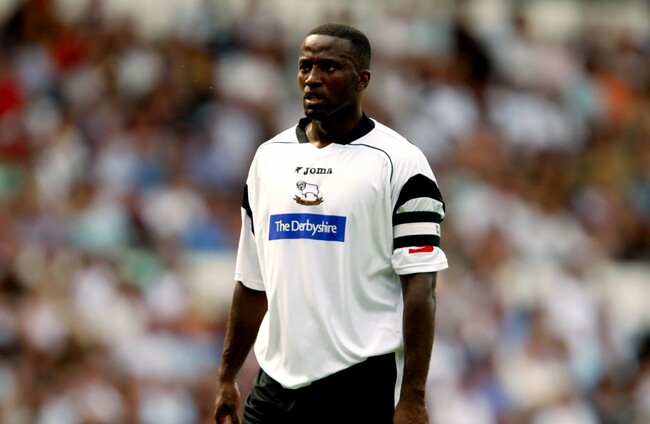FOR AN English-born former Premier League footballer, Michael Johnson’s career has featured some unlikely destinations, including Jamaica, Guyana and now Limerick.
Earlier this month, it was announced by his representatives Oporto Sports that Johnson had agreed to become Sporting Director of Limerick FC’s new club academy.
The role will be combined with Johnson’s other commitments, as an elite coach with England U21s and a club ambassador for Derby County.
It is the latest step in a long career in football for the 47-year-old.
He made his debut at 18 for a Neil Warnock-managed Notts County team against Arsenal, the season prior to the inaugural Premier League campaign, before later having stints at Birmingham City, Derby County, Sheffield Wednesday (on loan) and Notts County (again).
Despite being told by some people that he was “too small” to be a centre-back at 5’10, Johnson’s senior playing career lasted almost 20 years, with three seasons in the top flight and an appearance in the 2001 League Cup final (which Birmingham lost to Liverpool on penalties) among the highlights.
Born in Nottingham, he represented his parents’ country of birth Jamaica on 13 occasions between 1999 and 2003. He also gained more experience in international football recently, as he was the national coach of Guyana between 2018 and 2019, helping them qualify for the Gold Cup, the first major tournament the country had reached in their history.
Having already managed a side who were hovering near the bottom of the Fifa world rankings, Johnson’s latest role looks similarly challenging. He joins Limerick FC at a turbulent time in the club’s history. For the past two seasons, owing to financial difficulties and failure to meet licencing requirements, the club have not been represented at senior level in the League of Ireland. By contrast, ahead of this year, another Limerick-based side, Treaty United, were granted entry into the First Division.
Johnson, however, is hopeful of better days to come at his new club, and he will work closely with their U14s, U15s and U17s sides, who are set to field teams this campaign.
“It was a close friend of mine that alerted me to the fact that I was on Limerick’s hit list, in terms of people that they wanted to interview,” he tells The42.
“I got a phone call off [club chairman] Pat O’Sullivan: ‘Would I be interested in coming in?’ I told him of my current commitments with the England national team and the set-up in the FA. He said: ‘No problem, we can work with that. We can come to some solution, but we’d be very much interested in talking to you.
“Obviously, I knew about the club, once I knew about the role, but didn’t know what had happened to the club.
“But it was the right time for me to do something like that with Limerick.”
Expanding on what his role entails, he says: “There’s a lot of tracking young players, a lot of recruitment, a lot of coach education, a lot of methodologies to try to work some style of play back in at Limerick. So there’s a lot of on-field stuff and off-field rebuilding, in terms of fans, local communities, parents as well who have probably lost a bit of faith and trust in Limerick. So it’s a big project.”
Johnson’s work so far has been undertaken primarily via Skype. The pandemic and ensuing difficulty with flights mean he has yet to set foot in Limerick, while the fact that there is still no clarity on when the underage leagues will begin is a further complication.
The coach does intend on spending plenty of time in Limerick once Covid-19 restrictions are eased, while he is also planning to speak from afar with several of the club’s youngsters next week.
“We’re going to need the community, businesses, everybody to try to rebuild the club back to what it once was,” he adds.
Johnson has signed a one-year contract, but he will “ideally” extend that deal, as he regards the role as a long-term project, with the “ultimate goal” being a return to the League of Ireland.
He also plays down any concerns that balancing the position with his other jobs will be too difficult.
“It kind of supplements each one of my roles. My role at Derby is not exhaustive. It’s more match-day stuff. But the season is now coming to an end, and even if it was in-season, every other Saturday we’re away, and I don’t travel away. So when Derby play away, it allows me to spend that weekend over in Limerick. That’s going to be the plan, to spend as much time [as possible] in Limerick when Derby are away from home.
“If it gets too much, we’ll have a re-think, but because of where things are at with the world at the minute, it kind of works.
“And I think an important thing for us all to think about is the possible links we could forge. Nothing has been set in stone. But once the season ends in England, I think there will be conversations I’ll have with the powers that be about trying to extend some bridge between Limerick and Derby. That’s a strong possibility and something that we’ve got up our sleeve, in terms of an attractive proposition for many of the youngsters up in Ireland.
“I’m not going to say they’re going to go into the first team [at Derby], but the opportunity to come and get a career and move to an English club will be there, because of the connections that I have in the game, not just in Derby County but throughout the English leagues. You might look at League One or League Two, so I think that was attractive to Pat — the opportunities potentially for some of the better youngsters [to move].”
***
Johnson’s career has encompassed encounters with some of football’s most high-profile figures. As a player, his opponents included Roy Keane and Steven Gerrard, while his first coaching job in charge of the U18s at Notts County was given to him by former England boss Sven-Göran Eriksson.
He has also spent time coaching at underage level with Birmingham and Cardiff, as well as securing a Uefa pro licence, an LMA diploma in management, a master’s in sporting directorship from Manchester Met University and Uefa master’s for international players.
Despite transitioning straight into the off-field roles, he admits to finding retirement from playing to have been “very difficult”.
Consequently, to help other players navigate the tricky terrain of hanging up their boots, alongside Emile Heskey, Gaizka Mendieta, Stiliyan Petrov and former Ireland international Gareth Farrelly, he founded Player4Player, whose mission is “to support current and former professional footballers in their careers on and off the pitch”.
He explains: “We all met on the international master’s players’ course in the evening time. We were discussing the game with many other big players across Europe on this course and the similarities were all around [with regard to] retiring from the game. The majority of our discussions were about how difficult it was. We decided to set the company up to try to help many others who are having difficulty transitioning out of the game, trying to help them with our experience.
“It’s doing really well in terms of engaging with a lot of players, [who are asking]: ‘How did you guys find it, what did you do, how do I get to [the position of] a CEO or sporting director?’”
Despite all the experience he has accrued, it has not always been easy for Johnson, with the lack of opportunities for black coaches in football well documented. Does he believe he has suffered due to this issue?
“I wouldn’t say ‘suffered,’ I’ve been denied opportunities. But I’ve always been positive and that’s why I like to look at myself as somebody that’s really qualified now in the game because I’ve never allowed it to define me or to stop me from doing what I want to do or can achieve. So I’ve always moved and [thought]: ‘Okay, I’ll get this qualification or I’ll do this.’
“But there’s no getting away from the facts that show there are problems within the game in terms of senior leadership positions, management in the Premier League, and it’s not a fair representation when you look at the proportionality of [black] players that play currently in the Premier League, you’re looking at nearly 40%.
“Less than 4% are managers of colour and less than 2% in senior leadership roles, so there’s work to be done. Let’s see how that goes in the next year or so because there’s a new governance code that’s come out in England to try to help level the playing field.
“I am optimistic [that positive change will be implemented], but with the little caveat of history. I have to go by what history has taught me over the last 20-30 years — it’s been slow.
“One of the main things for me doing the role that I do with Limerick as a sporting director, I’m very much a people person, I like working with people. Within the role that you have as a sporting director, you have the chance to put a lot of wrongs right. You’ve got a chance to lead an organisation and no matter what sexuality, gender, ethnicity, race, faith, you can influence organisations to make sure the best people are in a position to do the roles.”
The topic of inclusion invokes the most controversial moment of Johnson’s career. In a 2012 interview, he was asked if he supported the FA’s campaign against homophobia and responded: ”Because of my beliefs, because of the Bible that I read, in the Bible it does state that homosexuality is detestable unto the Lord.”
After the comments resurfaced in 2014, Johnson stepped down from the Football Association’s Inclusion Advisory Board following criticism he received.
In a 2014 statement released to The Guardian, he was quoted as saying: ”I was invited on to the programme in March 2012 to talk about my faith. I was not prepared for the question and it is with deep regret that I answered it in the way I did back then. It was wrong and relates to a view I no longer hold.”
Asked about the controversy now, Johnson says: “Life is about making mistakes and if you don’t make mistakes, you never learn. And I don’t think there’s anybody who’s never made a mistake, whether it was comments… And listen, that’s something I never wrote or said. It’s something that was tweaked that way.
“If anybody wants to go into my past, you can speak to anybody within the industry that knows me and knows that’s not reflective of the man Michael Johnson is.
“You don’t have a career and work at the top level of English football if that’s the way people perceive you.
“So I think life is about making mistakes. Could I have worded some things differently? Of course.
“But you reflect back nearly 10 years ago and think you are a lot better [now], with 10 years of experience and education. And that’s where I’m currently situated at.”
On whether he feels the remarks hampered his career in any way, he adds: “Not at all. I think when people know you as an individual, which this game does, it could never have hampered me. Because if it hampered you, you wouldn’t have had the success you had at clubs as a coach, as a manager of an international team going out to Guyana and taking them to the Gold Cup, and also working within the highest establishment in English football, the FA. I’m very happy with my career and the way it has unfolded.
“I look back and there are some real big achievements personally in my football career and even more so in my coaching and management career. So I’m living the dream.”














Will cause a stir in Bruff